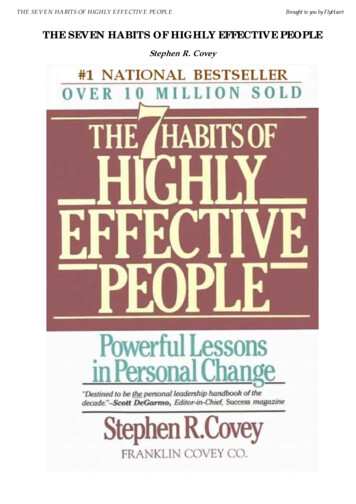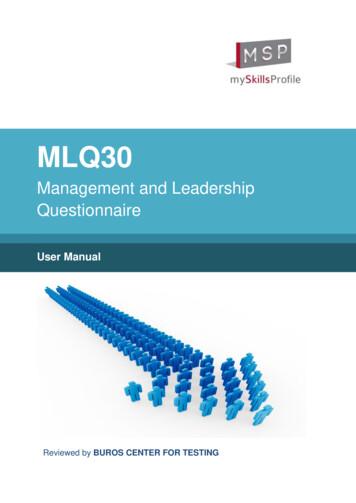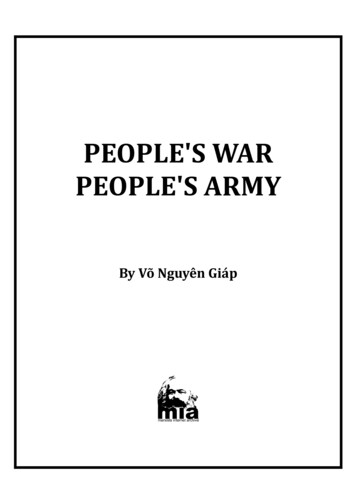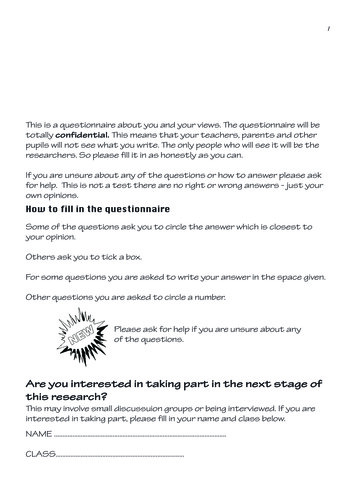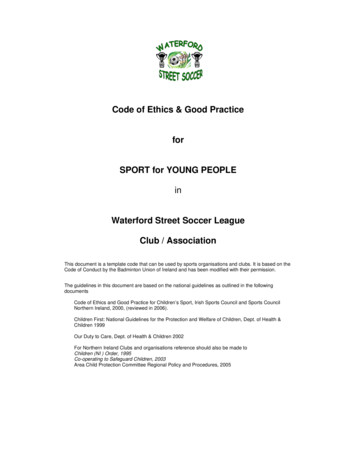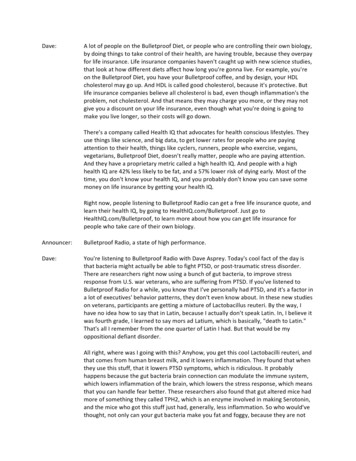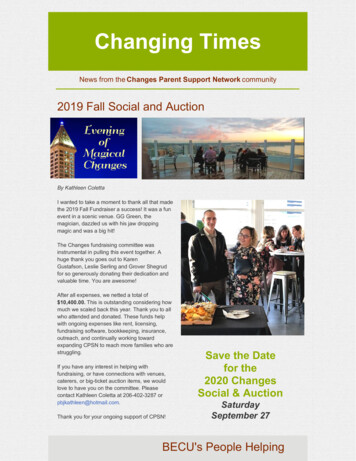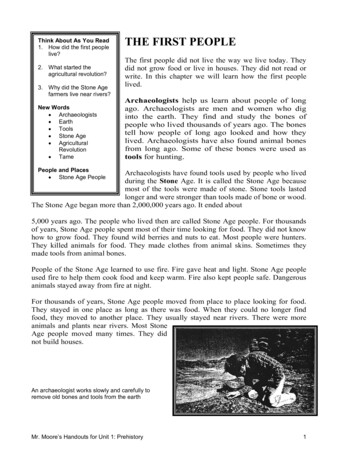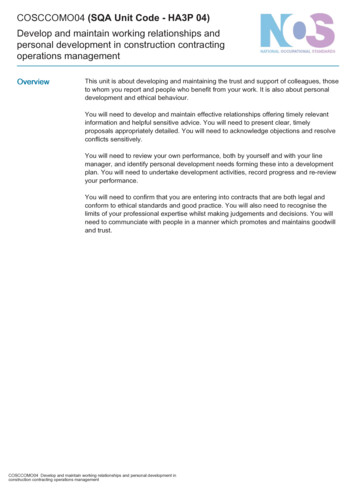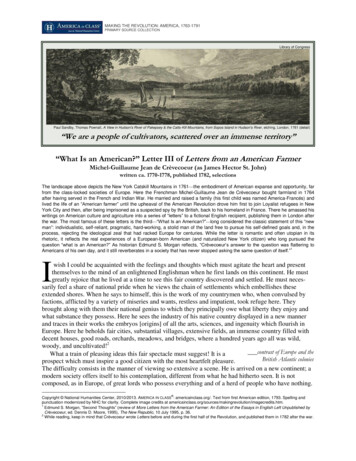
Transcription
MAKING THE REVOLUTION: AMERICA, 1763-1791PRIMARY SOURCE COLLECTIONLibrary of CongressPaul Sandby, Thomas Pownall, A View in Hudson's River of Pakepsey & the Catts-Kill Mountains, from Sopos Island in Hudson's River, etching, London, 1761 (detail)“We are a people of cultivators, scattered over an immense territory”*“What Is an American?” Letter III of Letters from an American FarmerMichel-Guillaume Jean de Crèvecoeur (as James Hector St. John)written ca. 1770-1778, published 1782, selectionsThe landscape above depicts the New York Catskill Mountains in 1761 the embodiment of American expanse and opportunity, farfrom the class-locked societies of Europe. Here the Frenchman Michel-Guillaume Jean de Crèvecoeur bought farmland in 1764after having served in the French and Indian War. He married and raised a family (his first child was named America-Francés) andlived the life of an “American farmer” until the upheaval of the American Revolution drove him first to join Loyalist refugees in NewYork City and then, after being imprisoned as a suspected spy by the British, back to his homeland in France. There he amassed hiswritings on American culture and agriculture into a series of “letters” to a fictional English recipient, publishing them in London afterthe war. The most famous of these letters is the third “What Is an American?” long considered the classic statement of this “newman”: individualistic, self-reliant, pragmatic, hard-working, a stolid man of the land free to pursue his self-defined goals and, in theprocess, rejecting the ideological zeal that had racked Europe for centuries. While the letter is romantic and often utopian in itsrhetoric, it reflects the real experiences of a European-born American (and naturalized New York citizen) who long pursued thequestion “what is an American?” As historian Edmund S. Morgan reflects, “Crèvecoeur’s answer to the question was flattering toAmericans of his own day, and it still reverberates in a society that has never stopped asking the same question of itself.”1Iwish I could be acquainted with the feelings and thoughts which must agitate the heart and presentthemselves to the mind of an enlightened Englishman when he first lands on this continent. He mustgreatly rejoice that he lived at a time to see this fair country discovered and settled. He must necessarily feel a share of national pride when he views the chain of settlements which embellishes theseextended shores. When he says to himself, this is the work of my countrymen who, when convulsed byfactions, afflicted by a variety of miseries and wants, restless and impatient, took refuge here. Theybrought along with them their national genius to which they principally owe what liberty they enjoy andwhat substance they possess. Here he sees the industry of his native country displayed in a new mannerand traces in their works the embryos [origins] of all the arts, sciences, and ingenuity which flourish inEurope. Here he beholds fair cities, substantial villages, extensive fields, an immense country filled withdecent houses, good roads, orchards, meadows, and bridges, where a hundred years ago all was wild,woody, and uncultivated!2contrast of Europe and theWhat a train of pleasing ideas this fair spectacle must suggest! It is aBritish Atlantic coloniesprospect which must inspire a good citizen with the most heartfelt pleasure.The difficulty consists in the manner of viewing so extensive a scene. He is arrived on a new continent; amodern society offers itself to his contemplation, different from what he had hitherto seen. It is notcomposed, as in Europe, of great lords who possess everything and of a herd of people who have nothing.*Copyright National Humanities Center, 2010/2013. AMERICA IN CLASS : americainclass.org/. Text from first American edition, 1793. Spelling andpunctuation modernized by NHC for clarity. Complete image credits at redits.htm.1Edmund S. Morgan, “Second Thoughts” (review of More Letters from the American Farmer: An Edition of the Essays in English Left Unpublished byCrèvecoeur, ed. Dennis D. Moore, 1995), The New Republic, 10 July 1995, p. 36.2While reading, keep in mind that Crèvecoeur wrote Letters before and during the first half of the Revolution, and published them in 1782 after the war.
Here are no aristocratical families, no courts,no kings, no bishops, no ecclesiastical[church-based] dominion, no invisible powergiving to a few a very visible one; no greatmanufacturers employing thousands, no greatrefinements of luxury. The rich and the poorare not so far removed from each other asthey are in Europe.Some few towns excepted, we are alltillers of the earth, from Nova Scotia to WestFlorida. We are a people of cultivators,scattered over an immense territory,communicating with each other by means ofgood roads and navigable rivers, united bythe silken bands of mild government, allrespecting the laws without dreading theirpower, because they are equitable. We are allanimated with the spirit of an industry whichis unfettered and unrestrained because eachPeter Bell, A New and Accurate Map of North America, London, 1771 (detail).Red dot marks approximate location of Crèvecoeur’s farm, Pine Hill.person works for himself. If he travelsthrough our rural districts, he views not thehostile castle and the haughty mansion, contrasted with the clay-built hut and miserable cabin where cattleand men help to keep each other warm and dwell in meanness, smoke, and indigence.3 A pleasinguniformity of decent competence appears throughout our habitations. The meanest [least/simplest] of ourlog-houses is a dry and comfortableWe have no princes for whom we toil,habitation. Lawyer or merchant are the faireststarve, and bleed. We are the mosttitles our towns afford that of a farmer isthe only appellation of the rural inhabitants ofperfect society now existing in the world.our country.4 It must take some time ereHere man is free as he ought to be . . .[before] he can reconcile himself to ourdictionary, which is but short in words of dignity and names of honor. There, on a Sunday, he sees acongregation of respectable farmers and their wives, all clad in neat homespun, well mounted [on horses]or riding in their own humble wagons. There is not among them an esquire, saving the unletteredmagistrate.5 There he sees a parson as simple as his flock, a farmer who does not riot [live in excess] onthe labor of others. We have no princes for whom we toil, starve, and bleed. We are the most perfectsociety now existing in the world. Here man is free as he ought to be; nor is this pleasing equality sotransitory as many others are. Many ages will not see the shores of our great lakes replenished with inlandnations, nor the unknown bounds of North America entirely peopled. Who can tell how far it extends?Who can tell the millions of men whom it will feed and contain? for no European foot has as yet travelledhalf the extent of this mighty continent!The next wish of this traveller will be to know whence came all thesediversity and mixture ofpeople? They are a mixture of English, Scotch, Irish, French, Dutch,European peoples in AmericaGermans, and Swedes. From this promiscuous breed,6 that race now calledAmericans have arisen. The eastern provinces [colonies] must indeed be excepted, as being the unmixeddescendants of Englishmen. I have heard many wish that they had been more intermixed also: for mypart, I am no wisher, and think it much better as it has happened. They exhibit a most conspicuous figureLibrary of Congress3I.e., on sordid, beastly conditions, in smoke-filled abodes, in extreme poverty and need.I.e., with no European titles of nobility such as lord, duke, etc.I.e., no titled and privileged “gentleman” the rank designated with “esquire” in England (and in the American colonies) ”saving the unletteredmagistrate,” i.e., except for a relatively uneducated judge or local judicial official.6I.e., made up of a mixture of people brought together by happenstance, not by plan; not referring to sexual promiscuity.45National Humanities Center Crèvecoeur, “What Is an American?” Letter III of Letters from an American Farmer, 1782, selections2
Library of CongressSandby/Pownall, A View in Hudson's River of Pakepsey & the Catts-Kill Mountains, . . . , London, 1761 (detail)in this great and variegated picture; they too enter for a great share in the pleasing perspective displayedin these thirteen provinces. I know it is fashionable to reflect on them,7 but I respect them for what theyhave done — for the accuracy and wisdom with which they have settled their territory; for the decency oftheir manners; for their early love of letters [learning]; their ancient college, the first in this hemisphere;8for their industry,9 which to me, who am but a farmer, is the criterion of everything. There never was apeople, situated as they are, who with so ungrateful a soil have done more in so short a time. Do you thinkthat the monarchial ingredients which are more prevalent in other governments have purged them from allfoul stains? Their histories assert the contrary.In this great American asylum [haven], the poor of Europe have by“the American, this new man”some means met together, and in consequence of various causes. Towhat purpose should they ask one another what countrymen they are? Alas, two thirds of them had nocountry. Can a wretch who wanders about, who works and starves, whose life is a continual scene of soreaffliction or pinching penury [extreme poverty] — can that man call England or any other kingdom hiscountry? A country that had no bread for him, whose fields procured him no harvest, who met withnothing but the frowns of the rich, the severity of the laws, with jails and punishments, who owned not asingle foot of the extensive surface of this planet? No! urged by a variety of motives, here they came.Everything has tended to regenerate them — new laws, a newHere they are become men.mode of living, a new social system. Here they are becomeIn Europe they were as somen. In Europe they were as so many useless plants.Wanting [lacking] vegetative mold and refreshing showers,many useless plants.they withered and were mowed down by want, hunger, andwar; but now, by the power of transplantation, like all other plants they have taken root and flourished!Formerly they were not numbered in any civil list of their country, except in those of the poor. Here theyrank as citizens. By what invisible power has this surprising metamorphosis been performed? By that ofthe laws and that of their industry. The laws, the indulgent laws, protect them as they arrive, stamping onthem the symbol of adoption. They receive ample rewards for their labors; these accumulated rewardsprocure them lands; those lands confer on them the title of freemen, and to that title every benefit isaffixed which men can possibly require. This is the great operation daily performed by our laws. Fromwhence proceed these laws? From our government. Whence that government? It is derived from theoriginal genius and strong desire of the people, ratified and confirmed by government. This is the greatchain which links us all; this is the picture which every province exhibits, Nova Scotia excepted.10 There7I.e., comment disparagingly on them.Harvard College, created in Boston in 1636.I.e., industriousness.10Nova Scotia had been part of French Canada until 1710 when the British gained the territory during Queen Anne’s War. The French Catholic settlers(Acadians) and the native Mi’kmaq firmly resisted British rule for decades.89National Humanities Center Crèvecoeur, “What Is an American?” Letter III of Letters from an American Farmer, 1782, selections3
the crown [British government] has done all. Either there were no people who had genius or it was notmuch attended to. The consequence is that the province is very thinly inhabited indeed. The power of thecrown, in conjunction with the mosquitoes, has prevented men from settling there. Yet some part of itflourished once, and it contained a mild harmless set of people. But for the fault of a few leaders, thewhole were banished.11 The greatest political error the crown ever committed in America was to cut offmen from a country which wanted nothing but men!What attachment can a poor European emigrant have for a country where he had nothing? Theknowledge of the language, the love of a few kindred as poor as himself, were the only cords that tiedhim. His country is now that which gives him land, bread, protection, and consequence. Ubi panis ibipatria is the motto of all emigrants.12 What then is the American, this new man? He is either a Europeanor the descendant of an European; hence that strange mixture of blood which you will find in no othercountry. I could point out to you a man whose grandfather was an Englishman, whose wife was Dutch,whose son married a French woman, and whose present four sons have now four wives of differentnations. He is an American, who, leaving behind him all his ancient prejudices and manners, receives newones from the new mode of life he has embraced, the new government he obeys, and the new rank heholds. He becomes an American by being received in the broad lap of our great Alma Mater.13Here individuals of all nations areThe American is a new man, who acts uponmelted into a new race of men, whosenew principles. He must therefore entertainlabors and posterity [descendants]will one day cause great changes innew ideas and form new opinions.the world. Americans are the westernpilgrims, who are carrying along with them that great mass of arts, sciences, vigor, and industry whichbegan long since in the east — they will finish the great circle. The Americans were once scattered allover Europe; here they are incorporated into one of the finest systems of population which has everappeared, and which will hereafter become distinct by the power of the different climates they inhabit.The American ought, therefore, to love this country much better than that wherein either he or hisforefathers were born. Here the rewards of his industry follow with equal steps the progress of his labor.His labor is founded on the basis of nature, self-interest — can it want a stronger allurement? Wives andchildren, who before in vain demanded of him a morsel of bread, now, fat and frolicsome, gladly helptheir father to clear those fields whence exuberant crops are to arise to feed and to clothe them all, withoutany part being claimed either by a despotic prince, a rich abbot, or a mighty lord. Here religion demandsbut little of him — a small voluntary salary to the minister and gratitude to God; can he refuse these? TheAmerican is a new man, who acts upon new principles. He must therefore entertain new ideas and formnew opinions. From involuntary idleness, servile dependence, penury, and useless labor, he has passed totoils of a very different nature, rewarded by ample subsistence. This is an American.North America is divided into many provinces, forming a largeRegional differences in the vastassociation, scattered along a coast 1,500 miles extent and aboutexpanse of British North America200 wide. This society I would fain [gladly] examine, at least suchas it appears in the middle provinces. If it does not afford that variety of tinges and gradations which maybe observed in Europe, we have colors peculiar to ourselves. For instance, it is natural to conceive thatthose who live near the sea must be very different from those who live in the woods; the intermediatespace will afford a separate and distinct class.Men are like plants — the goodness and flavor of the fruit proceed from the peculiar soil andexposition in which they grow. We are nothing but what we derive from the air we breathe, the climatewe inhabit, the government we obey, the system of religion we profess, and the nature of ouremployment. Here you will find but few crimes; these have acquired as yet no root among us. I wish Iwere able to trace all my ideas. If my ignorance prevents me from describing them properly, I hope I shallbe able to delineate a few of the outlines, which are all I propose.111213In 1755 the British began the forced emigration of Acadians from Nova Scotia; many later settled in French Louisiana (“Cajuns,” from Acadians).Where there is bread, there is my country [Latin].Literally, nourishing mother; often used to refer to one’s college or university [Latin].National Humanities Center Crèvecoeur, “What Is an American?” Letter III of Letters from an American Farmer, 1782, selections4
Those who live near the sea feed more on fish than on flesh, and often encounter that boisterouselement. This renders them more bold and enterprising; this leads them to neglect the confinedoccupations of the land. They see and converse with a variety of people, their intercourse with mankindbecomes extensive. The sea inspires them with a love of traffic, a desire of transporting produce from oneplace to another; leads them to a variety of resources which supply the place of labor. Those who inhabitthe middle settlements, by far the most numerous, must be very different. The simple cultivation of theearth purifies them, but the indulgences of the government, the soft remonstrances of religion, the rank ofindependent freeholders, must necessarily inspire them with sentiments very little known in Europeamong people of the same class. What do I say? Europe has no such class of men. The early knowledgethey acquire, the early bargains they make, give them a great degree of sagacity [wisdom]. As freementhey will be litigious — pride and obstinacy are often the cause of lawsuits; the nature of our laws andgovernments may be another. As citizens, it is easy to imagine that they will carefully read the newspapers, enter into every political disquisition, freely blame or censure governors and others. As farmers,they will be careful and anxious to get as much as they can, because what they get is their own. Asnorthern men they will love the cheerful cup. As Christians, religion curbs them not in their opinions; thegeneral indulgence leaves everyone to think for themselves in spiritual matters the laws inspect [direct]our actions, our thoughts are left to God. Industry, good living, selfishness, litigiousness, country politics,the pride of freemen, religious indifference, are their characteristics. If you recede still farther from thesea, you will come into more modern settlements; they exhibit the same strong lineaments, in a ruderappearance. Religion seems to have still less influence, and their manners are less improved.Now we arrive near the great woods, near the last inhabited districts. There men seem to be placed stillfarther beyond the reach of government, which in some measure leaves them to themselves. How can itpervade every corner; as they were driven there by misfortunes, necessity of beginnings, desire ofacquiring large tracts of land, idleness, frequent want of economy, ancient debts; the reunion of suchpeople does not afford a very pleasing spectacle. When discord, want of unity and friendship wheneither drunkenness or idleness prevail in such remote districts contention, inactivity, and wretchednessmust ensue. There are not the same remedies to these evils as in a long established community. The fewmagistrates they have are in general little better than the rest; they are often in a perfect state of war that of man against man, sometimes decided by blows, sometimes by means of the law; that of managainst every wild inhabitant of these venerable woods, of which they are come to dispossess them. Theremen appear to be no better than carnivorous animals of a superior rank, living on the flesh of wild animalswhen they can catch them, and when they are not able, they subsist on the grain.He who would wish to see America in its proper light, and have a trueAmerican backcountry settlersidea of its feeble beginnings and barbarous rudiments, must visit ourextended line of frontiers where the last settlers dwell, and where he may see the first labors of settlement,the mode of clearing the earth, in all their different appearances; where men are wholly left dependent ontheir native tempers, and on the spur of uncertain industry, which often fails when not sanctified by theefficacy of a few moral rules. There, remote from the power of example and check of shame, many familiesexhibit the most hideous parts of our society. They are a kind of forlorn hope, preceding by ten or twelveyears the most respectable army of veterans which come after them. In that space, prosperity will polishsome, vice and the law will drive off the rest, who uniting again with others like themselves will recede stillfarther; making room for more industrious people, who will finish their improvements, convert the loghouseinto a convenient habitation, and rejoicing that the first heavy labors are finished, will change in a few yearsthat hitherto barbarous country into a fine, fertile, well regulated district.Such is our progress, such is the march of the Europeans toward the interior parts of this continent. Inall societies there are offcasts; this impure part serves as our precursors or pioneers. My father himselfwas one of that class, but he came upon honest principles and was therefore one of the few who held fast.By good conduct and temperance, he transmitted to me his fair inheritance, when not above one infourteen of his contemporaries had the same good fortune.1414Crèvecoeur was born in 1735 into an aristocratic family in Normandy, a region of northern France.National Humanities Center Crèvecoeur, “What Is an American?” Letter III of Letters from an American Farmer, 1782, selections5
Forty years ago this smiling country was thus inhabited. It is now purged, a general decency ofmanners prevails throughout, and such has been the fate of our best countries [regions].Exclusive of those general characteristics, each province has its own, founded on the government,climate, mode of husbandry [agriculture], customs, and peculiarity of circumstances. Europeans submitinsensibly to these great powers, and become, in the course of a few generations, not only Americans ingeneral, but either Pennsylvanians, Virginians, or provincials under some other name. Whoever traversesthe continent must easily observe those strong differences, which will grow more evident in time. Theinhabitants of Canada, Massachusetts, the middle provinces, the southern ones will be as different as theirclimates their only points of unity will be those of religion and language.As I have endeavored to show you how Europeans becomeReligious tolerance among AmericansAmericans, it may not be disagreeable to show you likewise howthe various Christian sects introduced, wear out, and how religious indifference [i.e., tolerance] becomesprevalent. When any considerable number of a particular sect happen to dwell contiguous to each other,they immediately erect a temple and there worship the divinity agreeably to their own peculiar ideas.Nobody disturbs them. If any new sect springs up in Europe, it may happen that many of its professorswill come and settle in America. As they bring their zeal with them, they are at liberty to make proselytesif they can, and to build a meeting [church] and to follow the dictates of their consciences; for neither thegovernment nor any other power interferes. If they are peaceable subjects and are industrious, what is it totheir neighbors how and in what manner they think fit to address their prayers to the Supreme Being? Butif the sectaries [e.g., parishes] are not settled close together, if they are mixed with other denominations,their zeal will cool for want of fuel and will be extinguished in a little time. Then the Americans becomeas to religion what they are as to country allied to all. In them the name of Englishman, Frenchman,and European is lost, and in like manner, the strict modesThen the Americans become asof Christianity as practiced in Europe are lost also. Thiseffect will extend itself still farther hereafter, and thoughto religion what they are as tothis may appear to you as a strange idea, yet it is a verycountry allied to all.true one. I shall be able perhaps hereafter to explain myselfbetter, in the meanwhile, let the following example serve as my first justification.Let us suppose you and I to be travelling. We observe that in this house, to the right, lives a Catholic,who prays to God as he has been taught and believes in transubstantiation.15 He works and raises wheat;he has a large family of children, all hale and robust; his belief, his prayers offend nobody. About onemile farther on the same road, his next neighbor may be a good honest plodding German Lutheran, whoaddresses himself to the same God, the God of all, agreeably to the modes he has been educated in, andbelieves in consubstantiation.16 By so doing he scandalizes nobody he also works in his fields,embellishes the earth, clears swamps, &c [etc.]. What has the world to do with his Lutheran principles?He persecutes nobody and nobody persecutes him, he visits his neighbors and his neighbors visit him.Next to him lives a seceder, the most enthusiastic of all sectaries.17 His zeal is hot and fiery, but separatedas he is from others of the same complexion [group], he has no congregation of his own to resort to,where he might cabal [conspire] and mingle religious pride with worldly obstinacy. He likewise raisesgood crops, his house is handsomely painted, his orchard is one of the fairest in the neighborhood. Howdoes it concern the welfare of the country, or of the province at large, what this man’s religioussentiments are? He is a good farmer, he is a sober, peaceable, good citizen. William Penn himself wouldnot wish for more. This is the visible character; the invisible one [spiritual] is only guessed at, and isnobody’s business. Next again lives a Low Dutchman, who implicitly believes the rules laid down by thesynod of Dort.18 He conceives no other idea of a clergyman than that of an hired man: if he does his workwell he will pay him the stipulated sum; if not, he will dismiss him and do without his sermons, and let15Transubstantiation: the doctrine in Roman Catholic Christianity that, in the celebration of the Mass, bread and wine are changed completely into thebody and blood of Christ, that no material non-divine substance remains in the bread and wine.Consubstantiation: the doctrine in Protestant Christianity, with denominational variations, that Christ is spiritually but not physically present in theEucharist, that its substance remains bread and wine.17Seceders: Scottish Presbyterians (who left the Church of Scotland in 1732), described by Crèvecoeur as the most zealous of Protestant dissenters.18Synod of Dort: meeting of the Dutch Reformed Church in Holland in 1618-1619 to settle doctrinal differences about the path to salvation.16National Humanities Center Crèvecoeur, “What Is an American?” Letter III of Letters from an American Farmer, 1782, selections6
his church be shut up for years. But notwithstanding this coarse idea, you will find his house and farm tobe the neatest in all the country; and you will judge by his wagon and fat horses that he thinks more of theaffairs of this world than of those of the next. He is sober and laborious, therefore he is all he ought to beas to the affairs of this life; as for those of the next, he must trust to the great Creator.Each of these people instruct their children as well as they can [in religious doctrine], but theseinstructions are feeble compared to those which are given to the youth of the poorest class in Europe.Their children will therefore grow up less zealous and more indifferent in matters of religion than theirparents. The foolish vanity, or rather the fury, of. . . thus in a few years this mixedmaking proselytes [followers] is unknown here.They have no time; the seasons call for all theirneighborhood will exhibit a strangeattention, and thus in a few years this mixedreligious medley that will be neitherneighborhood will exhibit a strange religiouspure Catholicism nor pure Calvinism.medley that will be neither pure Catholicism norpure Calvinism. A very perceptible indifference,even in the first generation, will become apparent; and it may happen that the daughter of the Catholicwill marry the son of the seceder, and settle by themselves at a distance from their parents. What religiouseducation will they give their children? A very imperfect one. If there happens to be in the neighborhoodany place of worship, we will suppose a Quaker’s meeting; rather than not show their fine clothes, theywill go to it, and some of them may perhaps attach themselves to that society. Others will remain in aperfect state of indifference. The children of these zealous parents will not be able to tell what theirreligious principles are, and their grandchildren still less. The neighborhood of a place of worshipgenerally leads them to it, and the action of going thither is the strongest evidence they can give of theirattachment to any sect.The Quakers are the only people who retain a fondness for their own mode of worship; for be theyever so far separated from each other, they hold a sort of communion with the society and seldom departfrom its rules, at least in this country.Thus all sects are mixed as well as all nations; thus religious indifference is imperceptiblydisseminated from one end of the continent to the other which is at present one of the strongestcharacteristics of the Americans. Where this will reach no one can tell; perhaps it may leave a vacuum fitto receive other systems. Persecution, religious pride, the love of contradiction, are the food of what theworld commonly calls religion. These motives have ceased here. Zeal in Europe is confined; here itevaporates in the great distance it has to travel. There it is a gra
“What Is an American?” Letter III of Letters from an American Farmer Michel-Guillaume Jean de Crèvecoeur (as James Hector St. John) written ca. 1770-1778, published 1782, selections The landscape above depicts the New York Catskill Mountains in 1761 the embodiment
